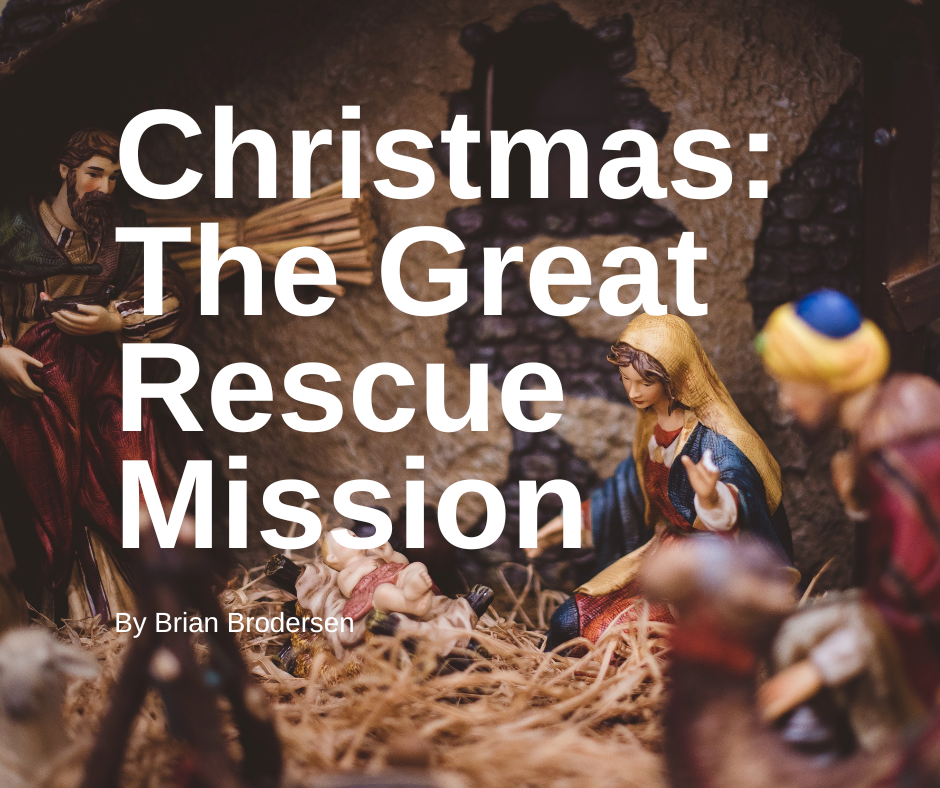
For much of the culture at large, the true meaning of Christmas is almost totally lost. Most people think of Christmas sentimentally. A recent survey indicated that here in America, and I’m sure this would extend to the rest of the Western world as well, “a fewer number of people are celebrating Christmas as a religious holiday.” Of those surveyed here in the U.S., only 57 percent (down from 64 percent just 3 years ago) say they believe what the Gospels teach about the birth of Jesus. For most people, Christmas is about getting new things and spending time with family and friends. It’s not a bad thing to exchange gifts and spend time with family and friends, but if you leave Jesus out, calling the day Christ-mas makes little to no sense.
Yet even among believers, the true meaning of Christmas can often be obscured. We sentimentalize the manger surrounded by farm animals with baby Jesus in the center, asleep on the hay. But from the Biblical standpoint, Christmas is actually the fulfillment of the first phase of God’s Great Rescue Mission. If we fail to understand and celebrate Christmas in a way that overlooks or obscures that, then we have, to some degree, sentimentalized Christmas.
Seeing Christmas as God’s rescue mission, what do we see?
The Mission was Absolutely Necessary
“Long lay the world in sin and error pining” are words we have all heard and probably even sung for years. They are words that describe the human condition day after day, month after month, year after year, century after century—a pitiful situation we haven’t been able to free ourselves from even after thousands of years of attempting to do so. We had exhausted every hope of self-deliverance. We were Dead in Trespasses and Sins, Spiritually Blind, Living in Darkness, and Held Captive by Satan to do his will. To free us all from Satan’s power, one more powerful than he must intervene. As author Paul Tripp said, “Sin is so disastrous and inescapable that the only solution was for God to come and rescue us.”
Not only are we bound in sin and captives of the devil, we are also blind to our true condition. Blind to our need to be rescued. In an early episode of “The Crown” (Netflix), they portray Billy Graham’s visit to Queen Elizabeth during his 1954 London crusade.
The aristocracy, apart from the Queen, loathed the idea that this unsophisticated country boy from North Carolina would suggest that they were sinners in need of a savior. At one point, someone near the Queen spoke up, saying, “Holding a crusade gives the impression that we are no better than the pagans.” Yep, that’s how most people feel: dead in sin, captives of Satan and completely unaware of it all.
The Mission was Planned
All the way back to before the beginning of time, God, knowing that the ones he created and loved would be taken captive by the enemy, planned their rescue.
Matthew, in his Gospel, quotes two of Israel’s prophets to show that the events that unfolded in the manger in Bethlehem were happening according to God’s plan:
“Behold, the virgin shall conceive and bear a son, and they shall call his name Immanuel.” Isaiah 7:14
“But as for you Bethlehem … too little to be among the clans of Judah, from you One will come forth for Me to be ruler in Israel. His times of coming forth are from long ago, from the days of eternity.” Micah 5:2
His coming was ordained from the days of eternity—before time.
The Mission was Costly
Mary: I wonder if we ever stop to think about the price those involved in the rescue mission paid. Think of Mary. Of course, there was the honor of being chosen to be the mother of the Messiah, but not everyone believed the story of her being pregnant by supernatural means. This would cast a shadow of suspicion over her and tarnish her reputation for the rest of her life. Jewish writers would later accuse her of having an adulterous relationship with a Roman soldier. And that is only part of the cost. Think of what it was like for Mary to see her own son viciously turned on by the mob and brutally murdered by the state. As Simeon prophesied to Mary, “A sword will pierce your own soul.”
Joseph: Think about Joseph for a moment. The emotional difficulty he suffered initially upon hearing that his betrothed was with child. Surely, this would have rocked his world. It took nothing less than an angelic visitation and revelation about Mary’s condition and the child Mary would bear to bring him back to a state of peace of mind. All of this obviously took Joseph out of his comfort zone, to say the least.
God the Father: What about the cost to the Father who gave his one and only Son? The Father who sent his beloved into the world where he would be despised and rejected, mocked, ridiculed, spit upon, brutally beaten and murdered. And these are only the things we can see that Jesus suffered. God only knows all that was involved when Jesus was being made an offering for sin, as Isaiah prophesied.
God the Son: The emotional, physical, and spiritual sufferings of the Son are the price he paid to redeem us and bring us back to God. But even beyond that, what does it mean that God the Son would now and forever have His deity joined with humanity? Is there an unimaginable cost involved in that for Jesus? It seems so. We don’t know all that the Incarnation entailed, but it’s something to ponder. For all of those immediately involved in the mission to rescue the captives, there was a cost.
The Mission was Dangerous, even Deadly
The Incarnation was the first step toward the Crucifixion. And in between were many perils: Herod’s attempt to destroy Jesus as a child, the people of Nazareth attempting to throw him off a cliff, the constant plots and schemes of the religious leaders to destroy him. The mission was fraught with danger.
To save His people from their sins would require that He give His life in exchange for theirs. This is the reality of a rescue mission.
On July 4th, 1976, the IDF pulled off one of the greatest rescue missions of modern times when a commando unit liberated 102 Israeli and Jewish victims of the terrorist hijacking of Air France flight 139, which was given safe haven at the Entebbe International Airport by Idi Amin, the Ugandan dictator. This rescue mission was known as Operation Entebbe, but later became known as Operation Jonathan in memory of the unit’s leader, who was the only soldier killed during the mission—Lt. Col. Jonathan Netanyahu. He was the older brother of Israeli Prime Minister Benjamin Netanyahu.
The rescue mission that God sent His Son on would be dangerous; it would actually be deadly. In His effort to rescue us, Jesus would give up His own life. The manger was the first stop on the way to the cross.
The Mission was Personal
He shall save His people from their sins. This is a family matter. Christmas is the story of the Father sending the Son, the Older Brother, to rescue the children who have been abducted and are being held captive by their tormentors. Hebrews so profoundly expresses this, “Since the children share in flesh and blood, he likewise shared in their humanity, so that through death he could destroy the one who holds the power of death—that is, the devil, and set free those who were held captive all their lives by their fear of death.”
Mission Accomplished
So we see, Christmas is not mainly about gifts or decorations or food or family or friends or time off work, etc. Those are all good things, but they’re not the main thing, which is so much greater and more profound than all of those things could ever be in and of themselves. Christmas is about a loving Father who sent His Son on a mission, a mission to free us all from Satan’s power when we were gone astray, a mission to provide forgiveness for our sins and to bring us into a beautiful personal eternal relationship with the One who loves us with an everlasting love, the One who has a wonderful plan and purpose for our lives that stretches beyond time into eternity.
Christmas is nothing less than God’s ultimate rescue mission!







